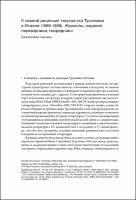Chapter К первой рецепции творчества Тургенева в Италии (1869-1908). Журналы, издания, переводчики, посредники
| dc.contributor.author | LAROCCA, GIUSEPPINA | |
| dc.date.accessioned | 2024-04-02T15:50:51Z | |
| dc.date.available | 2024-04-02T15:50:51Z | |
| dc.date.issued | 2023 | |
| dc.identifier | ONIX_20240402_9791221502381_218 | |
| dc.identifier.issn | 2612-7679 | |
| dc.identifier.uri | https://library.oapen.org/handle/20.500.12657/89249 | |
| dc.language | Russian | |
| dc.relation.ispartofseries | Biblioteca di Studi Slavistici | |
| dc.subject.classification | thema EDItEUR::D Biography, Literature and Literary studies::DS Literature: history and criticism | |
| dc.subject.other | Turgenev | |
| dc.subject.other | 20th Century Russian literature | |
| dc.subject.other | Russian literary canon | |
| dc.subject.other | Italian translation | |
| dc.subject.other | Italian reception | |
| dc.title | Chapter К первой рецепции творчества Тургенева в Италии (1869-1908). Журналы, издания, переводчики, посредники | |
| dc.type | chapter | |
| oapen.abstract.otherlanguage | On the First Reception of Ivan Turgenev’s Works (1869-1908) in Italy: Journals, Editions, Translators, and Cultural Mediators. This article presents the first analysis of the reception of Ivan Turgenev’s literary works in Italy from 1869 to 1908. It was during that time that the Italian translations of Turgenev’s short stories Uezdnyj lekar’ (The District Doctor) and Ermolaj i mel’nichixa, (Ermolay and the Miller’s Wife) appeared. In 1908, the reception of Turgenev’s works in Italy takes an intriguing turn, which coincides with the commencement of the influential Florentine journal La Voce. From the early 20th century up to the beginning of World War I the interest in translating Turgenev’s works and understanding his work becomes less intense. Notably, only after La Voce had ceased to be published this the captivation with Turgenev was again felt in Italy in the 1920s. During this time, Turgenev retained his status as a seminal figure in Russian literature, and some of his works were reissued regularly, yet not in the same way as in the earlier phase of his reception. Ardengo Soffici, one of the prominent figures of La Voce, argued in 1922 that Turgenev is an author hardly representative, unable to reflect either Russian or Western literary traditions, and too “provincial” and “worldly” to genuinely embody the Russian soul’s true essence. | |
| oapen.identifier.doi | 10.36253/979-12-215-0238-1.05 | |
| oapen.relation.isPublishedBy | bf65d21a-78e5-4ba2-983a-dbfa90962870 | |
| oapen.relation.isbn | 9791221502381 | |
| oapen.series.number | 55 | |
| oapen.pages | 17 | |
| oapen.place.publication | Florence |

